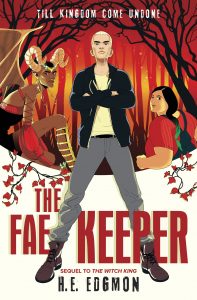Alex Brown Reviews The Fae Keeper by H.E. Edgmon
 The Fae Keeper, H.E. Edgmon (Inkyard 978-1-33542-591-1, $18.99. 432pp, hc) June 2022.
The Fae Keeper, H.E. Edgmon (Inkyard 978-1-33542-591-1, $18.99. 432pp, hc) June 2022.
H.E. Edgmon’s The Fae Keeper, the sequel to last year’s excellent young-adult fantasy The Witch King, is more vicious than its predecessor, taking the premise of oppressed witches fighting back against their fae oppressors and cranking it up to eleven.
This second book opens a couple weeks after the events of the first. Wyatt and Emyr are on the hunt for Derek Pierce and his sister Clarke. Emyr is also desperately trying – and largely failing – to keep Asalin from fracturing into civil war. The future of the kingdom rests in the hands of a group of queer teens unsure of how to establish a democracy without its citizens immediately turning it back into a fascist state. Meanwhile, someone keeps trying to assassinate Emyr and his dethroned father, the Pierce family are wreaking havoc in Asalin, and the other earthbound faery kingdoms are either staying out of it or getting a little too involved. That’s not to mention the secret communities of Changelings redefining what witch magic looks like and the dangerous creatures that snuck through the open Faery Door lurking around in the woods.
The Fae Keeper veers into some heavy territory. Besides racism, colonialism, oppression, slavery, and transphobia, the sequel also digs into trauma, the sometimes fuzzy boundary between healthy and toxic relationships, and sex. The book is definitely older YA verging into New Adult, yet no matter what, Edgmon always keeps teen readers as his focus. It would be ludicrous to assume no teenager has to deal with shifting friendships and relationships, consent, or state-sanctioned identity-based oppressions. Millions of teenagers all over this country are going through some of the same things Wyatt, Emyr, and Briar deal with, if not more and worse. Edgmon confronts those challenges head on, never pulling their punches or sugar-coating the situations. It’s not often readers get to experience characters having detailed discussions about the different shades of queer beyond the commonly known macro labels, unequivocally state that it is okay to revoke consent, or come to understand that a marker of a good relationship is having a partner that respects your needs. Some of it was stated very bluntly, but sometimes it’s better to just say something than to pile on the metaphors.
Later, we see consent expanded to a societal level when our protagonists visit a Changeling village in Aotearoa and again when they cross the threshold into Faery. At the heart of this novel is a conversation about decolonization. Decolonization is not reformation or electing new leaders from the same old parties. It is an intentional dismantling of oppressive systems. Decolonization should be treated as a verb; it is action and intent. Edgmon is careful not to copy and paste from any particular Indigenous cultures or use specific Native beliefs or traditions as fantasy metaphors, but their decolonial framework and centering of Indigenous perspectives shines from between the lines.
Clarke steps into her brother’s shoes as the role of Big Bad for this novel. At every opportunity for change, she and her equally as vile mother are there to kick Asalin back toward authoritarianism. Clarke becomes the literal personification of white supremacy and the patriarchy. The more Wyatt learns about how much human culture the fae adopted when they settled on Earth, the more he understands just how objectionable having a Black, gender-non-conforming person as king is to the Asalin fae. The Pierces use all of his identities as marks against him in determining whether he’s worthy of being or deserves to be a leader.
In my review of The Witch King, I wrote that it ‘‘is a story about transitions, not just of gender identity but of one’s sense of self, of relationships, of culture and community.’’ The Fae Keeper is less about transitions than about choices. Emyr learns the hard way that you cannot reform a system designed to be oppressive, not if your goals are equity and social justice; he’s forced to make choices about what kind of leader he wants to be and what kind of society he wants to have. Wyatt and Briar’s choices are more emotional. Their relationships with each other and Emyr are evolving into something new, and they have to decide if what they’re evolving into is what they want and need from them.
The Changelings and the Fae from the other side of the door must decide if they’re willing to risk their own safety to try and make things better for everyone. The Fae from other earthbound kingdoms must choose whether to consolidate their power by taking more from others or redistribute their power to benefit everyone. As an interesting contrast to Clarke, Wade Pierce is what happens when a person with privilege decides to actually do allyship work instead of simply declaring themselves an ally. He is determined to do better by his witch niece. He accepts that he is not owed forgiveness but continues to do work toward restitution and restorative justice, anyway.
It’s hard to not write a whole dissertation about The Fae Keeper. This series is everything I crave in young-adult fantasy. H.E. Edgmon is an intense, passionate writer who can craft queer narratives full of fire and fury. This is a hard-hitting conclusion to a stellar duology that I feel grateful to have read.
Alex Brown is a queer Black librarian and writer. They have written two books on the history of Napa County, California’s marginalized communities. They write about adult and young adult science fiction, fantasy, and horror as well as BIPOC history and librarianship. Diversity, equity, inclusion, and access set the foundation of all their work. Alex lives in Southern California with their pet rats and ever-increasing piles of books.
This review and more like it in the August 2022 issue of Locus.
 While you are here, please take a moment to support Locus with a one-time or recurring donation. We rely on reader donations to keep the magazine and site going, and would like to keep the site paywall free, but WE NEED YOUR FINANCIAL SUPPORT to continue quality coverage of the science fiction and fantasy field.
While you are here, please take a moment to support Locus with a one-time or recurring donation. We rely on reader donations to keep the magazine and site going, and would like to keep the site paywall free, but WE NEED YOUR FINANCIAL SUPPORT to continue quality coverage of the science fiction and fantasy field.
©Locus Magazine. Copyrighted material may not be republished without permission of LSFF.







